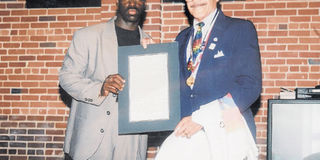Mal Whitfield, the man who transformed athletics in Africa

Prof Mal Whitfield (right) receives a gift from an admirer during a party organised in his honour by the 1996 Atlanta Olympic Games organising committee. PHOTO | WAIGWA KIBOI |
What you need to know:
- Legendary Kipchoge Keino says as a nation, we owe him a lot
- Keino and Whitfield were very close for decades.
One morning around mid 2009, Charles Nderitu Mukora, a former chairman for National Olympic Committee of Kenya and Member of Parliament for Laikipia and I were driven to Windsor Golf Hotel and Country Club.
We were to join Prof Mal Whitfield, a veteran American athletics coach, who, for close to 50 years had transformed Africa to be among the best in the world of athletics. This was one of the many meetings I had with Mal over the years, whenever he was in the country. My association with him was over 40 years.
It was Elias Makori, the former Daily Nation Sport Editor, who broke to me the news of Whitfield’s death as I was entering the library and he was getting out. He knew of my long association with Mal and as a seasoned sports journalist, was aware of the many athletes he had nurtured in Kenya and many parts of Africa.
I was aware he had been unwell for some time and was on a wheelchair. He had been put in a home for the elderly with proper care within Washington where family members could regularly visit him.
The first person I called after Makori’s “breaking news” was Dr Kipchoge Keino. Kip, as most people know him, told me calmly: “Yes, I am aware. Mal passed on when I was in Washington and had visited him a few days earlier and he looked frail. He was weak but determined to move on. After he had passed on, I went back to the family to condole them. It was indeed a very sad moment.”
Keino and Whitfield were very close for decades. Said Keino on phone: “Mal was very, very special not only to me as a person but to the growth of sports especially athletics in this country and the whole African continent. We have never had a man of this calibre. We all owe him a lot as a nation and continent —past, current and future athletes. One just needs to look at his record.’
Dr Mombi Thairu, a Kenyan based in California, USA, who is the president of the International Multicultural Society for Sports Entertainment also president and CEO African Sports Business Association said of Whitfield: “He was a very resourceful and selfless person, who did a lot when I was starting up. For those who know the true meaning of sports and business, we have lost a very dear person.”
Dr Mombi had on a number of occasions told me that there were plans to honour Whitfield for his immense contribution to sports, among other achievements. That can only be done posthumously, through the family.
Efforts to get comments from Mukora are hindered by the fact that his memory has been failing. He has been unwell for some time. It is time the authorities in this country did something for this great Kenyan among other forgotten heroes. He did a lot for this country, together with Whitfield and Keino.
Both Whitfield and I have paid him a visit at different times. Mukora has been a member of the Mal Whitfield Foundation based in Washington DC.
As a five-time Olympic medal winner (including two gold medals in 1948 London and 1952 Helsinki Games) three-time Pan Am Gold Medallist, and Helms World Trophy recipient, Whitfield, was also the first soldier on active duty to win a gold medal for the armed services, and the first Black American to be given the prestigious Sullivan Award.
During his close to 34 years of Government service he travelled to some 132 countries conducting training clinics, counselled, and coached some of the African continent’s greatest athletes, including Keino, Mamo Walde Miruts Yifter of Ethiopia, Filbert Bayi, John Akiibua, Mike Boit, Peter Rono, Marie Mutola among many others.
In his book Beyond the Finish Line, Keino is quoted as saying: “Mal Whitfield is the Father of Organised Athletics in Africa.”
Many years ago, as African Affairs Consultant Foreign Service Officer, he helped set up a programme in Kenya that would give US President Barack Obama’s father an opportunity to study in the United States. Whitfield was a diplomat based in Kenya and his job was to assist young, promising Kenyans get an education in the US.
Little did Whitfield think in his wildest imagination that one of these students would end up fathering the first African American president of the United States! There were hundreds of them over the years.
Whitfield did not remember meeting Obama senior in person. But he knew a thing or two about making the most of a rare opportunity.
He once called me on phone from Washington DC in November 1994 urgently wanting to know if I knew a former athlete, Nyandika Maiyoro, and whether he was still alive.
I told him yes. I went to Kisii and got all the details he wanted.




